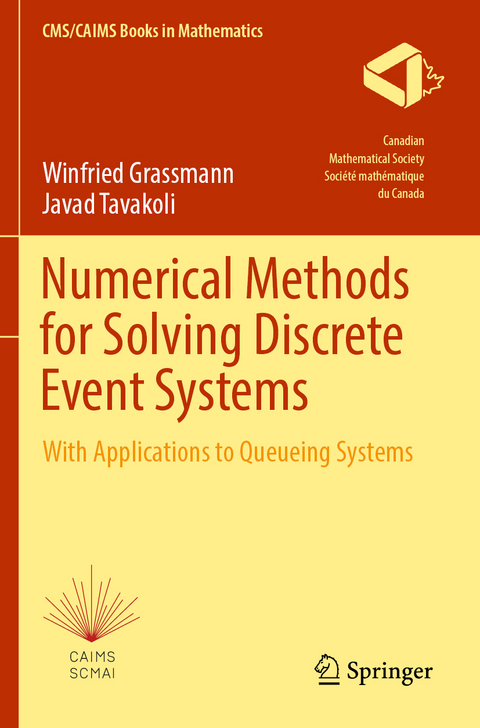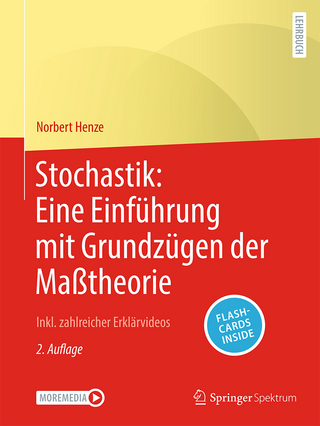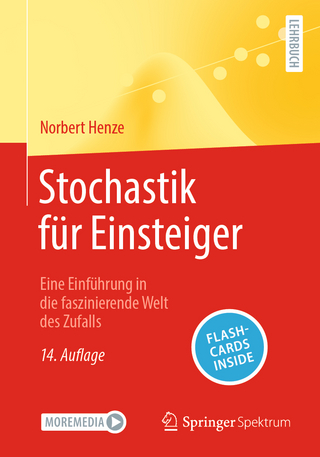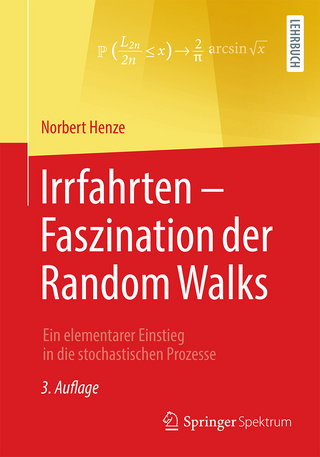
Numerical Methods for Solving Discrete Event Systems
Springer International Publishing (Verlag)
978-3-031-10084-0 (ISBN)
This graduate textbook provides an alternative to discrete event simulation. It describes how to formulate discrete event systems, how to convert them into Markov chains, and how to calculate their transient and equilibrium probabilities. The most appropriate methods for finding these probabilities are described in some detail, and templates for efficient algorithms are provided. These algorithms can be executed on any laptop, even in cases where the Markov chain has hundreds of thousands of states. This book features the probabilistic interpretation of Gaussian elimination, a concept that unifies many of the topics covered, such as embedded Markov chains and matrix analytic methods.
The material provided should aid practitioners significantly to solve their problems. This book also provides an interesting approach to teaching courses of stochastic processes.
Winfried Grassmann completed his Ph.D. at the University of Zurich, Switzerland, in 1967 with summa cum laude. After four years working as an operations research analyst at Swissair, the Swiss flag carrier, He joined the University of Saskatchewan, Canada, to teach operations research and computer science. Author of three books and numerous articles, Grassmann introduced the randomization method as a numerical tool and invented the Grassmann-Taksar-Heyman (GTH) method.
Javad Tavakoli holds a PhD in Categorical Algebra from Dalhousie University, NS, Canada. In 1996 he proudly had the opportunity to meet with Winfried Grassmann at the University of Saskatchewan, Canada, where he started his new research area in Applied Probability and Stochastic Processes. Javad Tavakoli has been a researcher and educator at the University of British Columbia Okanagan, Canada since 2003. He published a number of papers in Queuing Theory, mostly with Winfried Grassmann. Javad Tavakoli also has received several awards for teaching excellence and published a pre-calculus book from the indigenous perspective.
Basic Concepts and Definitions.- Systems with Events Generated by Poisson or by Binomial Processes.- Generating the Transition Matrix.- Systems with Events Created by Renewal Processes.- Systems with Events Created by Phase-type Processes.- Computational Complexity and Rounding and Truncation Errors.- Transient Solutions of Markov Chains.- Moving Toward the Statistical Equilibrium.- Equilibrium Solutions of Markov Chains and Related Topics.- Reducing the State Space Through Censoring and Embedding.- Systems with Independent or Almost Independent Components.- Infinite-State Markov Chains and Matrix Analytic Methods.
"This monograph is an exciting addition to the queueing/stochastic processes literature,
written by two highly respected senior researchers. ... The writing is precise and clear. Well-known models are used as examples to illustrate the methods presented. ... It has a huge number of powerful techniques that are not given sufficient focus elsewhere. This may be one of the best books to introduce graduate students ... . This monograph is essential for the bookshelf ... of every serious queueing theorist." (Myron Hlynka, Mathematical Reviews, December, 2023)
| Erscheinungsdatum | 07.11.2023 |
|---|---|
| Reihe/Serie | CMS/CAIMS Books in Mathematics |
| Zusatzinfo | XIV, 362 p. 4 illus., 2 illus. in color. |
| Verlagsort | Cham |
| Sprache | englisch |
| Maße | 155 x 235 mm |
| Gewicht | 636 g |
| Themenwelt | Mathematik / Informatik ► Mathematik ► Wahrscheinlichkeit / Kombinatorik |
| Schlagworte | discrete event systems • Inventory Control • markov chains • matrix analytic methods • Numerical Methods • Queueing |
| ISBN-10 | 3-031-10084-0 / 3031100840 |
| ISBN-13 | 978-3-031-10084-0 / 9783031100840 |
| Zustand | Neuware |
| Informationen gemäß Produktsicherheitsverordnung (GPSR) | |
| Haben Sie eine Frage zum Produkt? |
aus dem Bereich


